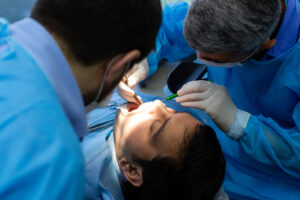How Long Do All on 4 Implants Last?
All-On-4 dental implants are a significant investment, and it’s understandable to expect them to be a lasting solution for missing teeth. The great news is that they are precisely that—a long-lasting option for restoring your smile and dental function. Research published in the Clinical Implant Dentistry and Related Research Journal reveals that the success rate for All-On-4 dental implants after 10 years is approximately 94.8%. This statistic highlights the durability and reliability of All-On-4 implants, showing how these implants are designed to stand the test of time, providing patients with a permanent and stable foundation for their prosthetic teeth.
The design of All-On-4 implants plays a significant role in their long-term performance. By utilising four titanium implant screws strategically placed in the jawbone, strength and stability are maximised. This precise positioning helps to distribute the biting force across a greater surface area, reducing strain on individual implants and promoting overall longevity.
Moreover, the materials used in All-On-4 implants are highly durable and biocompatible. Titanium, often utilised for dental implants, is known for its strength, corrosion resistance, and ability to fuse with bone without causing adverse reactions. These characteristics not only contribute to the longevity of the implants but also reduce the likelihood of complications down the line.
Consider this as similar to building a strong foundation for a house. Just as a stable foundation contributes to the durability of a structure, the secure placement of All-On-4 dental implants acts as a robust base for prosthetic teeth, providing patients with renewed confidence and seamless functionality.
The high success rates and robust design of All-On-4 dental implants provide patients with reassurance about their durability and longevity when compared to other tooth replacement options. This advanced treatment offers individuals not only an aesthetically pleasing smile but also a reliable oral function for many years to come.
Therefore—backed by solid research findings and expert design—All-On-4 dental implants prove to be an enduring solution for individuals seeking long-term tooth replacement.
Common Materials for All-On-4 Implants
All-On-4 dental implants are designed to be a permanent solution for tooth loss, utilising reliable materials to ensure longevity. The implant itself is commonly made from titanium, a biocompatible metal that integrates with the jawbone over time. This is crucial because titanium is known for its remarkable strength, resilience, and biocompatibility, meaning it won’t corrode or cause harm to your body.
Titanium’s Role in Durability
Biocompatibility of Titanium: Titanium’s biocompatibility significantly minimises the risk of allergic reactions and adverse effects within the body, making it an ideal choice for dental implants. This property also contributes to its durability by allowing for strong integration with the jawbone, creating a stable foundation for the prosthetic teeth.
This robust anchoring system sets All-On-4 implants apart, providing patients with the confidence that their new teeth can withstand normal wear and tear.
Resilience of Titanium: The ability of titanium to withstand pressure and heavy loads without bending or breaking is crucial for its role in dental implants. This resilience ensures that the implant can support biting and chewing forces during eating, offering stability and functionality similar to natural teeth.
As for the prosthetic teeth attached to these implants, high-quality materials such as ceramics or acrylics are commonly used.
Prosthetic Teeth: Ceramics and Acrylics
Natural Appearance: Ceramic or acrylic prosthetic teeth replicate the natural appearance of real teeth. This is particularly important for individuals who value aesthetics alongside functionality. The use of high-quality ceramics ensures that the prosthetic teeth closely resemble natural teeth in terms of colour, translucency, and texture.
Long-lasting Performance: In addition to their realistic appearance, ceramic and acrylic teeth offer exceptional durability and long-lasting performance. When properly cared for, these materials can withstand everyday use without significant wear or discoloration, adding to the overall longevity of All-On-4 dental implants.
These materials undergo specialised manufacturing processes to ensure their suitability for dental applications, meeting stringent standards for strength, biocompatibility, and aesthetics. Understanding the materials involved helps patients appreciate the level of quality and reliability offered by these innovative prosthetics.
When exploring solutions for maintaining your new smile’s pristine condition, understanding the best practises is key to ensuring prolonged implant life. Let’s now delve into the essential maintenance practises for extended implant durability.
Maintenance Practices for Prolonged Implant Life
You’ve made the investment in yourself and your smile by getting All-On-4 dental implants. It’s crucial to take care of them properly to ensure they stay strong and healthy for a long time. Maintenance involves simple daily habits that can make a big difference. Good oral hygiene is key, such as keeping your mouth clean, eating the right foods, and following your dentist’s advice to keep your new teeth looking and feeling great for many years.
Everyday actions like regular brushing and flossing are even more important now: Use a soft-bristled toothbrush with toothpaste at least twice a day. Gently brush around all sides of the implant, and don’t forget to floss carefully too. This helps remove any food or plaque that could cause damage.
Follow the Post-Implant Care Instructions
When you got your All-On-4 implants, your dental team would have provided you with special instructions on how to care for them.
Post-Implant Care: Pay close attention to these instructions—things like what kind of toothpaste to use, what foods to avoid at first, and how often you should visit the dentist are crucial in ensuring the long-term success of your implants. For instance, you may be advised to avoid hard or sticky foods in the first few weeks so as not to put pressure or strain on the implants. Seemingly small choices, like avoiding tobacco, will also make a difference. Another thing to consider is using a non-abrasive toothpaste that is gentler on implant-supported teeth. Harsh toothpaste can actually scratch or damage the implants over time.
Diet Restrictions: You may be advised by your dentist not to chew hard foods such as ice, nuts, or hard candy. These food items can exert excessive force on the implants and compromise their stability.
With these maintenance tips in mind, you’re setting yourself up for long-term success with your All-On-4 dental implants. And remember, it’s not just about keeping up with the normal daily routines – paying attention to those specific post-implant care instructions will also play a pivotal role in ensuring the longevity of your new smile.
Potential Challenges with All-On-4 Dental Implants
All-On-4 dental implants are a valuable investment, but like all surgical procedures, they come with potential challenges. One of the primary challenges is ensuring that you have enough bone density to support the implants. Just like securing a foundation for a house, your jaw needs to have enough bone to hold the implants securely in place, essential for the long-term success of the procedure.
If there isn’t enough bone density, you may need additional procedures such as bone grafting to build up the area before the implants can be placed. While this may seem like an inconvenience, it’s an important step to ensure the stability and longevity of your dental implants. The initial healing phase also presents a challenge as with any dental surgery. It’s not uncommon to experience some mild discomfort and swelling in the days following the procedure. Proper post-operative care and following your dentist’s instructions can help minimise these issues and speed up the healing process. Everyone’s body reacts differently to surgery, so some variation in healing time and symptoms is normal.
Another significant challenge lies in maintaining optimal oral hygiene after getting All-On-4 dental implants. As already discussed, effective daily cleaning routines and regular professional cleanings are crucial for preventing peri-implant diseases and ensuring the long-term success of your implants. These practises help keep your surrounding gum tissue healthy, prevent infection and the risk of implant failure, which can compromise the stability of the implants over time.
It’s worth noting that selecting suitable candidates for All-On-4 implants and comprehensive treatment planning play a vital role in managing these challenges effectively. Your dentist will evaluate factors such as your overall health, bone density, and lifestyle habits to determine if you’re a good candidate for the procedure.
Understanding these potential obstacles doesn’t detract from the many life-changing benefits of All-On-4 dental implants; rather, it highlights the importance of proper preparation and ongoing care to ensure optimal outcomes. Exploring these potential challenges provides an opportunity to thoughtfully consider how All-On-4 dental implants compare to other options available today.
If you are located in Tasmania and interested in having dental implant consultation, you can call our Launceston dental clinic to book a free implant consultation on (03) 6388 1558 or visit Dental Implants Tasmania to schedule online.



